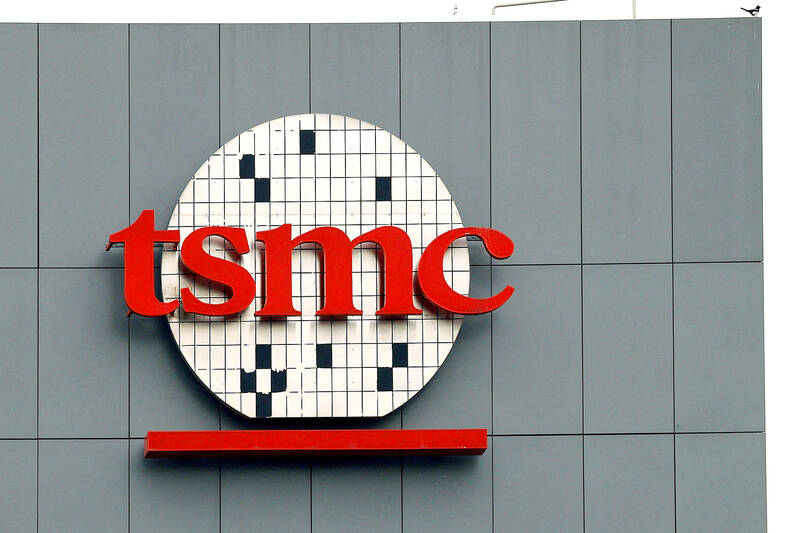Taiwan Semiconductor Manufacturing Co (TSMC, 台積電) senior vice president of business development Kevin Zhang (張曉強) told reporters yesterday that talks over a possible plant in Germany are continuing and that the earliest decision would be in August.
“I don’t want to get into the politics side of the thing, but I do think that there is a need for us to provide our customers with a diverse supply,” Zhang said, adding that Europe is a “very significant geography given the customer base ... [and] the demand.”
Zhang did not confirm the size of subsidy or cost of the potential project or which companies might be participating.

Photo: Ann Wang, Reuters
A spokesperson for the German Ministry for Economic Affairs and Climate Action confirmed that talks with TSMC were ongoing, but did not provide details.
Earlier this month it was reported that the Taiwanese chipmaker was in talks with partners to invest as much as 10 billion euros (US$10.8 billion) to build a chip fab in Germany.
Although semiconductor fabs’ costs vary according to capacity, chip type and country, the industry is one of the most capital-intensive, requiring construction of clean rooms and purchase of sophisticated manufacturing tools. Samsung Electronics Co, for example, spent about 60 trillion won (US$45.4 billion) to build two plants in Pyeongtaek, South Korea.
However, China’s ban on the use of US-based Micron Technology Inc’s chips in certain sectors, announced on Sunday, is a stark reminder of risks facing the global chip industry as it braces for escalating Sino-US trade tensions.
Micron, which makes DRAM and NAND flash memory chips, is the first US chipmaker to be targeted by Beijing after Washington over the past year unveiled a series of export controls to block certain chips and chipmaking technologies being used to advance China’s military capabilities.
While the move could benefit Micron’s key rivals — South Korea’s Samsung and SK Hynix Inc — in the near term, analysts said the growing geopolitical tensions cast a shadow over the industry, as companies need to navigate rising uncertainties that could impact investment and supply chain management.
“It takes huge amounts of pre-emptive investment to be a chipmaker, and it takes five years, 10 years to break even on those investments, so putting predictability into jeopardy makes investments difficult,” Korea Semiconductor Industry Association vice chairman Lee Chang-han said. “In the long term, this won’t help anybody.”

Among the rows of vibrators, rubber torsos and leather harnesses at a Chinese sex toys exhibition in Shanghai this weekend, the beginnings of an artificial intelligence (AI)-driven shift in the industry quietly pulsed. China manufactures about 70 percent of the world’s sex toys, most of it the “hardware” on display at the fair — whether that be technicolor tentacled dildos or hyper-realistic personalized silicone dolls. Yet smart toys have been rising in popularity for some time. Many major European and US brands already offer tech-enhanced products that can enable long-distance love, monitor well-being and even bring people one step closer to

Malaysia’s leader yesterday announced plans to build a massive semiconductor design park, aiming to boost the Southeast Asian nation’s role in the global chip industry. A prominent player in the semiconductor industry for decades, Malaysia accounts for an estimated 13 percent of global back-end manufacturing, according to German tech giant Bosch. Now it wants to go beyond production and emerge as a chip design powerhouse too, Malaysian Prime Minister Anwar Ibrahim said. “I am pleased to announce the largest IC (integrated circuit) Design Park in Southeast Asia, that will house world-class anchor tenants and collaborate with global companies such as Arm [Holdings PLC],”

TRANSFORMATION: Taiwan is now home to the largest Google hardware research and development center outside of the US, thanks to the nation’s economic policies President Tsai Ing-wen (蔡英文) yesterday attended an event marking the opening of Google’s second hardware research and development (R&D) office in Taiwan, which was held at New Taipei City’s Banciao District (板橋). This signals Taiwan’s transformation into the world’s largest Google hardware research and development center outside of the US, validating the nation’s economic policy in the past eight years, she said. The “five plus two” innovative industries policy, “six core strategic industries” initiative and infrastructure projects have grown the national industry and established resilient supply chains that withstood the COVID-19 pandemic, Tsai said. Taiwan has improved investment conditions of the domestic economy

Sales in the retail, and food and beverage sectors last month continued to rise, increasing 0.7 percent and 13.6 percent respectively from a year earlier, setting record highs for the month of March, the Ministry of Economic Affairs said yesterday. Sales in the wholesale sector also grew last month by 4.6 annually, mainly due to the business opportunities for emerging applications related to artificial intelligence (AI) and high-performance computing technologies, the ministry said in a report. The ministry forecast that retail, and food and beverage sales this month would retain their growth momentum as the former would benefit from Tomb Sweeping Day